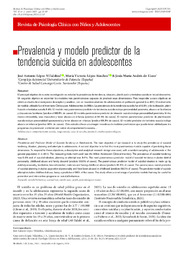Título :
Prevalencia y modelo predictor de la tendencia suicida en adolescentes |
Autor :
LOPEZ-VILLALOBOS, JOSE ANTONIO 
López-sánchez, María Victoria 
Andrés-de Llano, Jesús María |
Editor :
Universidad Miguel Hernández |
Departamento:
Departamentos de la UMH::Psicología de la Salud |
Fecha de publicación:
2025 |
URI :
https://hdl.handle.net/11000/35697 |
Resumen :
El principal objetivo de nuestra investigación es estudiar la prevalencia de tendencia, ideación, planificación y tentativa suicida en los adolescentes. Un segundo objetivo es encontrar los modelos más parsimoniosos capaces de predecir esas dimensiones. Para responder a esos objetivos se utilizó un diseño de investigación descriptivo y analítico, con un muestreo aleatorio de adolescentes en población general (n = 461). El instrumento de medida utilizado fue el Inventario Clínico para Adolescentes de Millon. La prevalencia de la tendencia suicida fue el 6.5% y de la ideación, planif icación o tentativa suicida 9.4%. El modelo más parsimonioso predictor de tendencia suicida incluye personalidad pesimista, abusos en la infancia y discusiones familiares (predice el 98.8% de casos). El modelo parsimonioso predictor de ideación suicida incluye personalidad pesimista, límite, menos introvertida, sexo masculino y tener abusos en infancia (predice el 95.9% de casos). El modelo parsimonioso predictor de planificación suicida incluye personalidad oposicionista y tener abusos en infancia (predice 88.3% de casos). El modelo predictor de tentativa suicida incluye abusos en infancia (predice 86% de casos). Este estudio ofrece una imagen novedosa de modelos predictores que puede tener utilidad para los programas de prevención e intervención sobre el comportamiento suicida.
Prevalence and Predictor Model of Suicide Tendency in Adolescents. The main objective of our research is to study the prevalence of suicidal tendency, ideation, planning and attempts in adolescents. A second objective is to find the most parsimonious models capable of predicting these dimensions. To respond to these objectives, a descriptive and analytical research design was used, with a random sampling of adolescents in the general population (n = 461). The measuring instrument used was the Millon Adolescent Clinical Inventory. The prevalence of suicidal tendency was 6.5% and of suicidal ideation, planning or attempt was 9.4%. The most parsimonious predictor model of suicidal tendency includes doleful personality, childhood abuse and family discord (predicts 98.8% of cases). The parsimonious predictor model of suicidal ideation is made up by doleful personality, borderline, less introverted, male sex and having childhood abuse (predicts 95.9% of cases). The parsimonious model predictor of suicidal planning includes oppositional personality and have been abused in childhood (predicts 88.3% of cases). The predictor model of suicide attempt includes childhood abuse, being a predictor of 86% of the cases. This study offers a novel image of predictor models that may be useful for prevention and intervention programs on suicidal behaviour.
|
Palabras clave/Materias:
comportamiento suicida
riesgo suicida
tasas de suicidio
juventud
estudios epidemiológicos
suicidal behaviour
suicidal risk
suicide rates
youth
epidemiological studies |
Área de conocimiento :
CDU: Filosofía y psicología: Psicología |
Tipo de documento :
info:eu-repo/semantics/article |
Derechos de acceso:
info:eu-repo/semantics/openAccess
Attribution-NonCommercial-NoDerivatives 4.0 Internacional |
DOI :
https://doi.org/10.21134/rpcna.2025.12.1.8 |
Publicado en:
Revista de psicología clínica con niños y adolescentes |
Aparece en las colecciones:
Revista de Psicología Clínica con Niños y Adolescentes (RPCNA) Vol. 12, Nº 1 (Enero 2025)
|
 La licencia se describe como: Atribución-NonComercial-NoDerivada 4.0 Internacional.
La licencia se describe como: Atribución-NonComercial-NoDerivada 4.0 Internacional.
.png)
